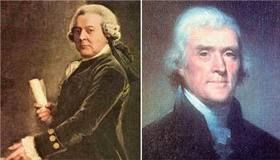This is your morning Open Thread. Pour your favorite beverage and review the past and comment on the future.
Find the past “On This Day in History” here.
Click on images to enlarge.
July 4 is the 185th day of the year (186th in leap years) in the Gregorian calendar. There are 180 days remaining until the end of the year. The Aphelion, the point in the year when the Earth is farthest from the Sun, occurs around this date.
 On this day in 1826, John Adams and Thomas Jefferson, the second and third presidents of the United States, respectively, die on this day, the 50th anniversary of the adoption of the Declaration of Independence.
On this day in 1826, John Adams and Thomas Jefferson, the second and third presidents of the United States, respectively, die on this day, the 50th anniversary of the adoption of the Declaration of Independence.
After the ratification of the U.S. Constitution, Adams was elected vice president to George Washington, and Jefferson was appointed secretary of state. During Washington’s administration, Jefferson, with his democratic ideals and concept of states’ rights, often came into conflict with Secretary of the Treasury Alexander Hamilton, who supported a strong federal government and conservative property rights. Adams often arbitrated between Hamilton and his old friend Jefferson, though in politics he was generally allied with Hamilton.
In 1796, Adams defeated Jefferson in the presidential election, but the latter became vice president, because at that time the office was still filled by the candidate who finished second. As president, Adams’ main concern was America’s deteriorating relationship with France, and war was only averted because of his considerable diplomatic talents. In 1800, Jefferson’s Democratic-Republicans (the forerunner of the Democratic Party) defeated the Federalist party of Adams and Hamilton, and Adams retired to his estate in Quincy, Massachusetts.
As president, Jefferson reduced the power and expenditures of the central government but advocated the purchase of the Louisiana Territory from France, which more than doubled the size of the United States. During his second administration, Jefferson faced renewed conflict with Great Britain, but he left office before the War of 1812 began. Jefferson retired to his estate in Monticello, Virginia, but he often advised his presidential successors and helped establish the University of Virginia. Jefferson also corresponded with John Adams to discuss politics, and these famous letters are regarded as masterpieces of the American enlightenment.
 John Adams’ Death
John Adams’ Death
Less than a month before his death, John Adams issued a statement about the destiny of the United States, which historians such as Joy Hakim have characterized as a “warning” for his fellow citizens. Adams said:
My best wishes, in the joys, and festivities, and the solemn services of that day on which will be completed the fiftieth year from its birth, of the independence of the United States: a memorable epoch in the annals of the human race, destined in future history to form the brightest or the blackest page, according to the use or the abuse of those political institutions by which they shall, in time to come, be shaped by the human mind.
On July 4, 1826, the fiftieth anniversary of the adoption of the Declaration of Independence, Adams died at his home in Quincy. Told that it was the Fourth, he answered clearly, “It is a great day. It is a good day.” His last words have been reported as “Thomas Jefferson survives”. His death left Charles Carroll of Carrollton as the last surviving signatory of the Declaration of Independence. John Adams died while his son John Quincy Adams was president.
His crypt lies at United First Parish Church (also known as the Church of the Presidents) in Quincy. Originally, he was buried in Hancock Cemetery, across the road from the Church. Until his record was broken by Ronald Reagan in 2001, he was the nation’s longest-living President (90 years, 247 days) maintaining that record for 175 years.
 Thomas Jefferson’s Death
Thomas Jefferson’s Death
Jefferson’ health began to deteriorate by July 1825, and by June 1826 he was confined to bed. He likely died from uremia, severe diarrhea, and pneumonia (?). Jefferson died on July 4, 1826, the fiftieth anniversary of the Declaration of Independence, and a few hours before John Adams.
Though born into a wealthy slave-owning family, Jefferson had many financial problems, and died deeply in debt. After his death, his possessions, including his slaves, were sold, as was Monticello in 1831. Thomas Jefferson is buried in the family cemetery at Monticello. The cemetery only is now owned and operated by the Monticello Association, a separate lineage society that is not affiliated with the Thomas Jefferson Foundation that runs the estate.
Jefferson wrote his own epitaph, which reads:
HERE WAS BURIED THOMAS JEFFERSON
AUTHOR OF THE DECLARATION OF AMERICAN INDEPENDENCE
OF THE STATUTE OF VIRGINIA FOR RELIGIOUS FREEDOM
AND FATHER OF THE UNIVERSITY OF VIRGINIA.
John Quincy Adams, the sixth President of the United States (1825-1829), was at his father’s bed side when he died. He was 7 days short of his 59th birthday



 On this day in 1917, Arabian troops led by
On this day in 1917, Arabian troops led by  On this day in 1826,
On this day in 1826, 

Recent Comments